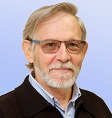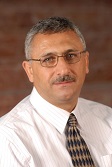-

IEEE CPE - POWERENG 2020
14th International Conference on Compatibility, Power Electronics and Power Engineering
online conference hosted in Setúbal - Portugal / 8 - 10 July, 2020

Leopoldo Garcia FranqueloUniversity of Seville Short BIO Leopoldo G. Franquelo (M’84–SM’96–F’05– LF’20) was born in Malaga, Spain. He received the M.Sc. and Ph.D. degrees in electrical engineering from the Universidad de Sevilla, Seville, Spain, in 1977 and 1980, respectively. He is currently a Professor with the Department of Electronics Engineering, US. His current research interests focus on modulation techniques for multilevel inverters and applications to power electronic systems for renewable energy systems. Prof. Franquelo has been an Industrial Electronics Society (IES) Distinguished Lecturer since 2006, he became an Associate Editor of the IEEE TRANSACTIONS ON INDUSTRIAL ELECTRONICS in 2007, a Co-Editor-in-Chief in 2014, and has been Editor-in-Chief (2015-2018) and founder Editor-in-Chief of the IEEE Open Journal of the Industrial Electronics Society since 2019. He was a Member-at-Large of the IES AdCom (2002–2003), the Vice President for Conferences (2004–2007), and the President-Elect of the IES (2008–2009). He was the President of the IES (2010–2011) and currently is an IES AdCom Life Member. He has received a number of best paper awards from IEEE journals. In 2012 and 2015, he received the Eugene Mittelmann Award and the Antohny J. Hornfeck Service Award from the IES, respectively.
Title: Smart Modular Power Converters Operation: Thermal and Power Quality Challenges Abstract Maintenance of power converters is actually a hot topic in any industrial application where critical electronic components suffer from aging and an operability level is required by standards. In order to improve the converter availability, fault tolerant capability and fast maintenance operations are important features to be achieved. Modular power converters are currently an attractive solution because of its inherent fault tolerant operation and reduced production and maintenance cost. In this talk, the advantages of using modular converters in a wide range of power applications are introduced. In addition, the smart operation of these converters based on the thermal control advanced modulation methods is addressed. Thanks to this family of modulation strategies, it is possible to smartly manage the remaining useful lifetime of each power cell of the modular structure in order to reduce the corresponding maintenance cost. These methodologies can benefit of advanced approaches to obtain both the thermal stress redistribution and the required power quality. 
Haitham Abu-RubTexas A&M University at Qatar Short BIO Haitham Abu-Rub is a full professor holding two PhDs from Gdansk University of Technology (1995) and from Gdansk University (2004). Dr. Abu Rub has long teaching and research experiences at many universities in many countries including Qatar, Poland, Palestine, USA, UK, and Germany. Since 2006, Dr. Abu-Rub has been associated with Texas A&M University at Qatar, where he has served for five years as the chair of Electrical and Computer Engineering Program and has been serving as the Managing director of the Smart Grid Center at the same university. His main research interests are energy conversion systems, smart grid, renewable energy systems, electric drives, and power electronic converters. Dr. Abu-Rub is the recipient of many prestigious international awards and recognitions, such as the American Fulbright Scholarship and the German Alexander von Humboldt Fellowship. He has co-authored around 400 journal and conference papers, five books, and five book chapters. Dr. Abu-Rub is an IEEE Fellow and Co-Editor in Chief of the IEEE Transactions on Industrial Electronics.
Title: Microgrids in the Future Grid Paradigm Abstract Microgrid (MG) system is considered the building block of the future smart grid paradigm. MG is a small-scale power grid consisting of distributed energy resources (particularly renewable), loads, storage, and local controllers. The MG is designed to operate in grid-connection and islanded modes with smooth disconnection from and reconnection to the grid. Developing a proper control and management system for various types (AC and DC) and numbers of MGs is a challenging task. Protecting the MG and the grid from various faults and operation modes is another challenge which the designers and operators should take care of. The talk will focus on the vision of transforming current grid into smart grid using the MG design approach. MGs structure, control, protection and secure operation will be explained during this talk. 
Manuel MatosEngineering Faculty of Porto University Short BIO Manuel A. Matos was born in 1955 in Porto, Portugal. He is with the Faculty of Engineering of the University of Porto (FEUP), Portugal, since 1978 (Full Professor since 2000). He is also coordinator of the Centre for Power and Energy Systems of INESC TEC and President of the Scientific Council of INESC TEC. His research interests include classical and fuzzy modeling of power systems, reliability, planning, optimization and decision-aid, with application to renewable energy sources integration, electric vehicles’ deployment and smart grids.
Title: Electric Distribution Networks - Future Role and Planning Issues Abstract Electric distribution networks were traditionally unidirectional, and the planning exercise in developed societies consisted mainly in reinforcements driven by load increase, in order to keep voltages within limits and avoid branch overloads. Distributed generation at MV networks changed a bit the situation but the essential practice remained the same. Now, the generalized presence of prosumers and DRES (namely in LV networks), along with DER (like batteries and electric vehicles) and emerging concepts like NZEB lead to situations where the network seems to be unnecessary or at least only occasionally useful, which creates regulatory challenges and turns planning a demanding exercise. The presentation will approach these issues by identifying the main changes and their impact, and discussing the possible pathways.
|